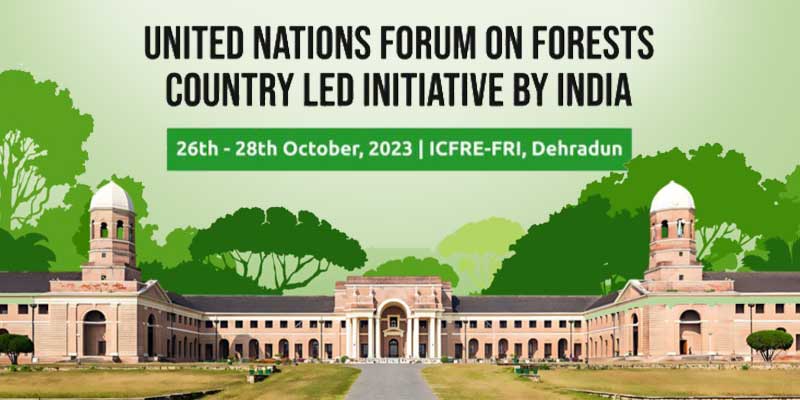- India
- Oct 26
Explainer - United Nations Forum on Forests (UNFF)
The ministry of environment, forest and climate change is organising a Country-Led Initiative event as part of the United Nations Forum on Forests (UNFF) from October 26 to 28 at the Forest Research Institute in Dehradun.
United Nations Forum on Forests (UNFF)
• The importance of forests to sustainable development was brought into sharp focus at the United Nations Conference on Environment and Development (UNCED) held in Rio de Jenairo, Brazil in 1992.
• During the conference, countries had intense negotiations over whether or not to have a forest convention to promote the management, conservation and sustainable development of all types of forests.
• Although the countries eventually failed to agree on a forest convention they managed to agree on the Non-legally Binding Authoritative Statement of Principles for a Global Consensus on the Management, Conservation and Sustainable Development of all Types of Forests, also known as the Forest Principles, as well as Chapter 11 of Agenda 21: Combating Deforestation.
• The international dialogue on forest policies continued under the United Nations through the Intergovernmental Panel on Forests (IPF) and the Intergovernmental Forum on Forests (IFF).
• In October 2000, the Economic and Social Council of the United Nations (ECOSOC) established the United Nations Forum on Forests (UNFF). The UNFF was established as part of a new international arrangement on forests.
• It is a subsidiary body with the main objective to promote the management, conservation and sustainable development of all types of forests and to strengthen long-term political commitment to this end based on the Rio Declaration, the Forest Principles, Chapter 11 of Agenda 21 and the outcome of the IPF/IFF Processes and other key milestones of international forest policy.
Its functions include:
i) Facilitating implementation of forest-related agreements and fostering a common understanding on sustainable forest management.
ii) Providing for continued policy development and dialogue among governments, international organisations, and major groups, in a holistic, comprehensive and integrated manner.
iii) Enhancing cooperation and policy and programme coordination on forest-related issues.
iv) Monitoring, assessing and reporting on progress towards, and strengthening political commitment for, sustainable forest management.
• Since its inception, the Forum has reached notable milestones including the adoption of the first UN Forest Instrument in 2007, the creation of the Global Forest Financing Facilitation Network (GFFFN) in 2015 and the adoption of the first UN Strategic Plan for Forests 2030 in 2017.
• The UNFF Secretariat, in the UN Department of Economic and Social Affairs, works to track progress in the implementation of the Strategic Plan.
• The UNFF has universal membership, and is composed of all Member States of the United Nations and specialised agencies.
• The Forum meets annually at the UN Headquarters in New York, bringing together representatives of all Member States and forests-related agencies.
• Every four years, a new ‘Quadrennial Programme of Work of the Forum’ sets out the operational and thematic priorities for upcoming UNFF sessions.
• In April 2017, the UN General Assembly adopted the first ever UN Strategic Plan for Forests 2017-2030.
• The Strategic Plan provides a global framework for actions at all levels to sustainably manage all types of forests and trees outside forests and halt deforestation and forest degradation.
• At the heart of the Strategic Plan are six Global Forest Goals and 26 associated targets to be achieved by 2030, which are voluntary and universal.
• They support the objectives of the International Arrangement on Forests and aim to contribute to progress on the Sustainable Development Goals, the Aichi Biodiversity Targets, the Paris Agreement adopted under the UN Framework Convention on Climate Change and other international forest-related instruments, processes, commitments and goals.
• As outlined in the Quadrennial programme of work of the Forum for the period 2017-2020, under the Forum’s new format – odd-year sessions will focus on discussions on implementation, technical advice and exchange of experiences while even-year sessions will focus on policy dialogue, development and decision-making.
Highlights of the event
• India is a founding member of UNFF.
• The CLI’s primary goal is to contribute to the discussions of UNFF regarding the implementation of Sustainable Forest Management and the UN Strategic Plan for Forests (UNSPF).
• In recent years, the world has witnessed an alarming increase in the scale and duration of wildfires, leading to profound impacts on biodiversity, ecosystem services, human well-being, livelihoods, and national economies.
• Forest areas have been particularly affected, with approximately 100 million hectares, equivalent to 3 per cent of the world’s forest area, affected by fires every year.
• The severity of these fires has been exemplified by numerous high-profile incidents, resulting in unhealthy air quality and significant loss of human lives, wildlife, ecosystem services and property, including wildfire disasters in the northern hemisphere this summer.
• The situation is no different in India, with changing climate forest fires are becoming a regular phenomenon.
• This meeting will host discussions amongst the participating states on these issue areas. This will be attended by more than 80 delegates participating from over 40 countries and 20 international organisations.
• It also aims to facilitate the sharing of best practices among UNFF Member States for the implementation of Sustainable Forest Management (SFM) and the UN Strategic Plan for Forests (UNSPF) 2030.
• The CLI will discuss on thematic areas involving forest fires and forest certification.
Manorama Yearbook app is now available on Google Play Store and iOS App Store


